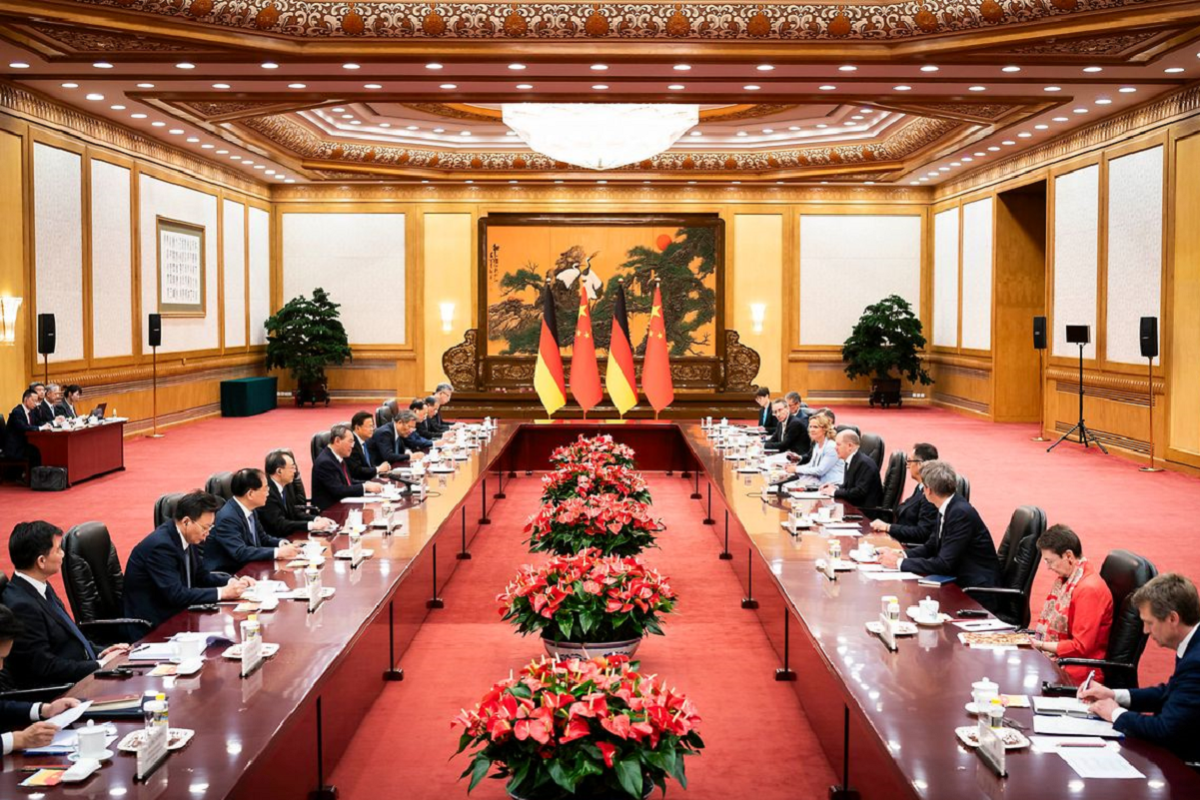China rejects “theory” of unfair solar PV production subsidies at Scholz’s Beijing visit
Chinese prime minister Li Qiang has rejected criticism about his country’s trade practices, which European companies have argued distort markets for solar panels and other products by subsidising enormous overcapacities that undermine competition. Li, speaking after a meeting with German chancellor Olaf Scholz in China’s capital Beijing, said the “theory about Chinese overcapacities” lacked a wider perspective.
“The claim that the Chinese industry’s advantages are formed by subsidies does not correspond to the facts,” he said, arguing that “appropriate overcapacities” would lead to “complete competition and survival of the fittest”. Comparative advantages in production held by individual countries could be made mutually beneficial if they are embedded in cooperation, Li said. “One should not arbitrarily judge which country has overcapacities,” he concluded. The world still needs “massively more” solar PV installations on its path to carbon neutrality, Li said.
He argued that subsidies in China are in line with the World Trade Organisation's (WTO) rules and do not fundamentally differ from the “current practice” in many other countries. “Renewable energy products are so competitive because we have made long-term investments in research and development and subsequently accumulated technical capabilities,” he said. Moreover, China was helped by its vast industrial basis, its internal market and huge labour capacity. “That’s why we have this comprehensive competitiveness or advantage,” he insisted. However, Chinese companies could also go bankrupt in open market competition, which had already happened, especially in the renewables sector, he added.
Overproduction and product dumping from China has been singled out by industry representatives as one of the main reasons German and European solar PV manufacturers have struggled to benefit from the current global solar expansion boom. China’s success in supplying western buyers with modern technology has previously severely hit the budding solar PV industry in Germany. Economic research institutes have warned that the Asian economic heavyweight could also undermine Germany’s position as a leading exporter in other technologies, for example regarding wind turbines or passenger cars amid the shift to electric vehicles.
German economic research institute IfW Kiel published an analysis in the week ahead of Scholz’s trip in which it found China to “particularly” support clean technology production. The institute said that this contributed to the country having an output of certain products that is up to nine times higher than that of similarly supported products in countries like Germany or the US. Chinese e-carmaker BYD would especially benefit from generous support, the institute said. "China's subsidy policy has been a controversial issue for years: European industries often struggle to compete with Chinese counterparts on price. However, without China's subsidized technology, products crucial for Germany's green transformation would become more expensive and scarce as well," said IfW researcher Dirk Dohse.
Germany itself has long been criticised by allied nations for its policy of running a trade surplus enabled by an industry that is focused on exports rather than on satisfying domestic demand. However, the EU has launched several probes into Chinese trade practices, which could lead to import restrictions if these are found to be problematic.
"We don’t want a de-coupling from China"
“China stands ready to import more high-quality products from Germany,” Li said, adding that the country is willing to scrap import restrictions on agricultural products. At the same time, Germany should abandon import restrictions on “Chinese high-tech products as well as products with a high added value”. Li, the second-highest ranking figure in China’s government after president Xi Jinping, said both countries could still deepen their collaboration on future technologies, especially in the automotive sector with a focus on “new energy vehicles”.
Chancellor Scholz said China and Germany continue to be important trade partners. “Both sides have benefitted enormously from this,” he argued. “That’s why it’s important for me to point out that we don’t want a de-coupling from China.” However, many companies in Germany and Europe would face grave difficulties due to economic policy decisions made by the Chinese government, the chancellor argued. Fair competition would therefore have to be the foundation for future collaboration, he added.
Just like China, Germany and other European countries sought to minimise risks for their economies by diversifying import sources and increasing the resilience of their businesses. However, shortly before the chancellor’s statement in Beijing, the German government agreed on new solar expansion rules in the country that ignored industry demands for a “resilience bonus” intended to support products made in Europe. Scholz said he had made it very clear during his visit that Germany expects China to abide by WTO rules. This trust in the Chinese willingness to cooperate had been underlined by the agreements made on agriculture, but also with respect to protecting biodiversity, reducing plastic waste, strengthening recycling, battery production and reducing waste in the construction sector.
Scholz, who met for more than three hours with president Xi, before later seeing premier Li, said he had pressed the case for China to guarantee German firms equal market access, the protection of intellectual property and a reliable legal system, news agency Reuters reported.
A recent survey by research institute ifo found that German companies generally managed to reduce their dependence on Chinese input materials in recent months. Since the beginning of Russia’s war on Ukraine in February 2022, the share of companies saying they depend on primary products from China had dropped from 46 to 37 percent, the institute said. “At the same time, we see that fewer companies plan to reduce their imports from China in the future,” said ifo researcher Lisandra Flach.
On the sidelines of the German chancellor’s visit to China, where Beijing’s role in sustaining Russia’s war effort in Ukraine played a central role, members of the German government and their Chinese counterparts also agreed to deepen cooperation in several other policy field. This included a joint agreement on autonomous and interconnected driving as well as a dialogue on circular economy concepts and resource efficiency.


